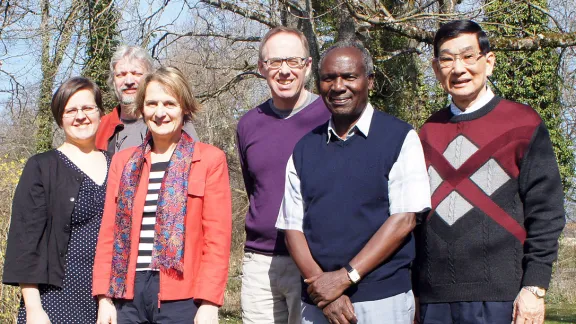
The working group on the Self-Understanding of the Lutheran Communion at its initial meeting. Photo: LWF/C.Kästner
Working Group Meets In Bossey, Switzerland
(LWI) – The working group on the Self-Understanding of the Lutheran Communion held its initial meeting on 18-21 March 2014 at the Ecumenical Institute in Bossey near Geneva, Switzerland. The group was formed following a decision of the Council of The Lutheran World Federation (LWF) 2013 in Geneva to deepen the understanding of what it means to be a communion of churches among the LWF member churches.
As outlined in the briefing to the working group, in 2013 the LWF Council decided that contemporary discussion on the nature of the LWF as a communion needed to respond to new contextual realities. Therefore members of the working group prepared and presented papers addressing different aspects of being a communion. Together they studied biblical texts and LWF documents and shared examples from their national backgrounds. Participants then discussed aspects such as the tensions between the churches’ rights to make their own decisions and their accountability to the communion, solidarity and finding a structure which accommodates different regional circumstances and customs.
Communion More Than a Concept
The working group consists of seven persons representing different regions and different theological expertise: Prof. Dr. Guillermo Hansen (Argentina), Dr. Minna Hietamäki (Finland), Rev. Dr. Allen Jorgenson (Canada), Bishop em. Dr Hance Mwakabana (Tanzania), Prof. Dr. Elisabeth Parmentier (France) and Prof Dr En Yu Thu (Malaysia). They were accompanied by LWF staff Rev. Dr. Kaisamari Hintikka, Rev. Dr. Simone Sinn, Rev. Dr. Patricia Cuyatti and Rev. Dr. Kenneth Mtata. The working group member from Eastern Europe was not able to attend.
According to the participants, the initial meeting was held in a very constructive and mindful working atmosphere. “The contexts of the different members of the working group are so different that I expected endless discussions without a possibility of convergence,” working group participant Elisabeth Parmentier remarked afterwards. “But we actually did not compete in the arguments for or against socio-ethical decisions. From the beginning we put the focus on the gift of the communion that we already share.”
Allen Jorgenson afterwards expressed his hope, that “behind the document we prepare readers will discern the communion we experienced as we shared stories of hope, of worry, of confusion, of God’s grace. (…) Communion was experienced in this gathering as an event more than a concept; not so much a meeting of like –minds as a soulful grappling together”.
A document from this meeting will be presented to the LWF council at their annual meeting in June. The working group will work together for 18 months jointly formulating a study document on the “Self-Understanding of the Lutheran Communion”. An accompanying publication will present the papers from this first meeting in 2015.


